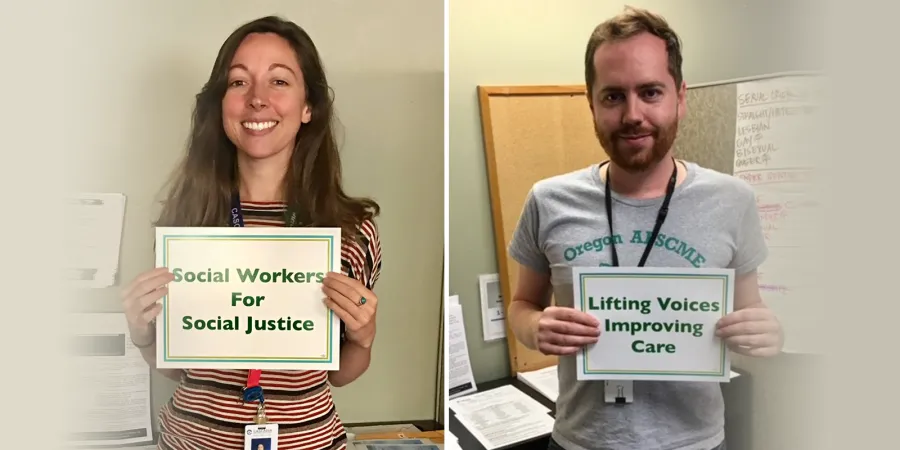Workers at Cascadia Behavioral Healthcare Say They Are Determined to Unionize

Workers at Cascadia Behavioral Healthcare are finding out just how empowering it is to organize for a voice on the job–to communicate and find common ground with their coworkers with the goal of forming a union.
But the struggle isn’t risk-free. Last month, Daneen Pray, who had worked at Cascadia Behavioral Healthcare in Portland, Oregon, for 17 years, was fired. She has been an activist and a strong supporter of the union.
And yet workers at Cascadia are more determined than ever to unionize. The same week that Pray was fired, dozens of workers signed cards to support the union and they’ve set a date for the union election: October 18.
“We’re ready!” said Michaela Grillo, a counselor and case manager at Cascadia.
Workers at Cascadia have been trying to organize for years, but one of the obstacles to forming a union has also been one of the problems that can only be solved through having a voice on the job: staff turnover. Working conditions are so bad that workers tend to leave after five or six months.
What’s different this time is the feeling that something has to change.
“Clients have told me that they’ve been here two years and have had five counselors,” Grillo says. “It’s definitely stressful and draining, and at the end of the day you can hardly think straight. The clients are experiencing so much pain, and that pain rubs off. You have three to five minutes between sessions and then you’re supposed to do paperwork, but people get weeks behind on paperwork. We don’t know when we’re supposed to do it… It’s hard to see people who need help and aren’t getting it. I could help them if I had time, but not in these conditions.”
Grillo has a background in social work and public health, and she treats people with serious and persistent mental illness–depression, bipolar disorder, schizophrenia, post-traumatic stress disorder and more. Most of her clients are on disability; some are homeless. This is a high-needs population, and she has a caseload of 80, which, in her words, is “really, really high.”
Mathias Quackenbush is in the same boat. A counselor and case manager at Cascadia, he treats 68 patients with severe mental illness and leads an anger management group as well.
“The way our caseloads are, it’s hard to do counseling on an ongoing basis and establish relationships that last,” he says. “I see up to seven clients each day, and paperwork is supposed to be half my job. The therapeutic relationship is the most important factor in helping someone, and at Cascadia it’s not respected at all. Just the opposite. Their business model doesn’t encourage the relationship. It encourages counselors to move along.”
But Quackenbush and Grillo are hoping to change that. With the help of their coworkers, they’ll continue to fight for a voice on the job; for open discussions with management about the budget and a say in how funding is allocated; for a standardized pay scale that increases over time; for more staff and a higher counselor-to-client ratio; for more flexible work hours; and, most importantly, for the opportunity through these and other changes to provide quality care to their clients.
“I’m hopeful,” Quackenbush says. “I tend to be pessimistic but right now we have a lot of strong support. Cascadia hired consultants to spread misinformation among the workers, to inflame anxiety by emphasizing catastrophic outcomes, but we’re developing communication apparatuses to reach everyone and counter their misinformation with facts. We’re trying to maintain community because community is our biggest asset.”
“It’s been very empowering being part of this process,” Grillo says. “I very frequently have to advocate for my clients but never advocated for myself to this extent. The industry is very complex, and I don’t know if our union will improve everything, so I’m not going to put all my expectations on that. But the union will be part of the solution, and I feel hopeful about that.”
